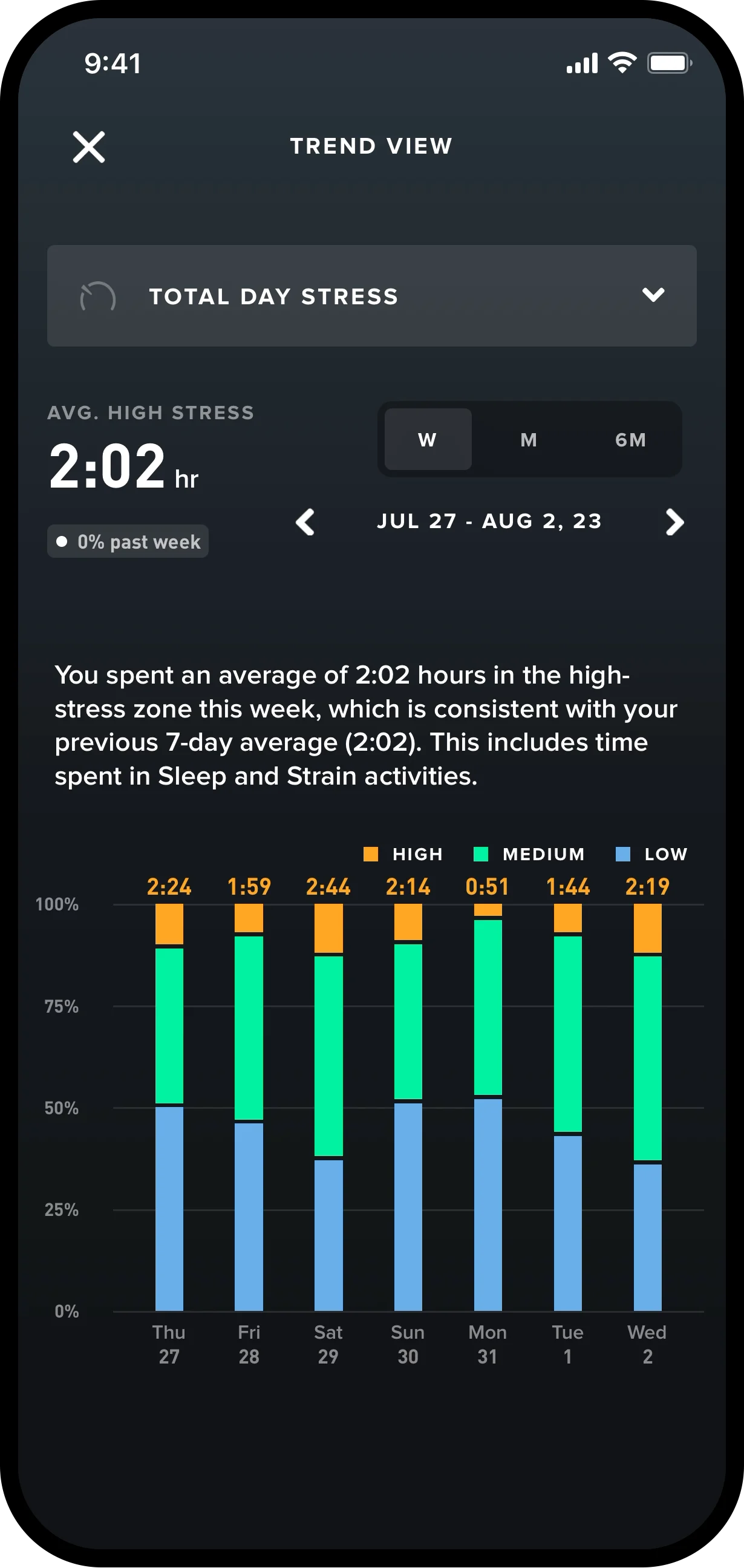Sleep trackers with stress monitoring measure sleep patterns and assess stress levels. They help improve sleep quality and manage stress effectively.
Sleep is crucial for overall health, and monitoring sleep patterns can provide insights into sleep quality. Modern sleep trackers now come with stress monitoring features. These devices track various parameters like heart rate variability and breathing patterns to gauge stress levels.
Users can identify stress triggers and make lifestyle adjustments. The real-time data helps in creating personalized sleep and stress management plans. These devices are user-friendly and often integrate with smartphones for easy data access. Investing in a sleep tracker with stress monitoring can lead to better sleep and reduced stress.
Introduction To Sleep Trackers With Stress Monitoring
Sleep is vital for our health. Today, sleep trackers are helping us understand our sleep patterns. These devices offer insights into how well we sleep. They also monitor stress levels. This is important for overall well-being.
What Are Sleep Trackers?
Sleep trackers are gadgets that monitor sleep. They collect data on sleep duration and quality. Many trackers are worn on the wrist. Others are placed under the mattress. Some even connect to smartphones.
These devices use sensors to track movements. They also monitor heart rate and breathing. Advanced trackers can detect sleep stages. This includes light, deep, and REM sleep. Some devices also measure stress levels.
Here’s a simple table to show key features:
| Feature | Description |
|---|---|
| Sleep Duration | How long do you sleep each night? |
| Sleep Quality | How restful your sleep is. |
| Heart Rate | Your heart rate during sleep. |
| Breathing | Your breathing patterns at night. |
| Stress Monitoring | Tracks stress levels while sleeping. |
Importance Of Sleep Tracking
Tracking sleep is essential for good health. Poor sleep affects mood, focus, and energy levels. A sleep tracker helps identify sleep issues. This can lead to better sleep habits.
Stress monitoring is another key feature. High stress can impact sleep quality. Knowing stress levels helps in managing them. This leads to better overall health.
Here are some benefits of sleep tracking:
- Improves sleep quality
- Helps identify sleep disorders
- Tracks sleep patterns over time
- Monitors heart rate and breathing
- Measures stress levels
Using a sleep tracker can lead to a healthier life. Better sleep means better health.
Key Features Of Modern Sleep Trackers
Modern sleep trackers come with a variety of advanced features. These features help users monitor their sleep and stress levels efficiently. This section will explore the key features of these innovative devices.
Advanced Sleep Metrics
Modern sleep trackers offer advanced sleep metrics. These metrics provide detailed insights into your sleep patterns. Here are some of the key metrics:
- Sleep Stages: Track light, deep, and REM sleep stages.
- Duration: Measure total sleep time.
- Quality: Evaluate the quality of your sleep.
- Heart Rate Variability: Monitor changes in heart rate during sleep.
- Breathing Patterns: Track your breathing rate and detect abnormalities.
| Metric | Description |
|---|---|
| Sleep Stages | Track light, deep, and REM sleep stages. |
| Sleep Duration | Measure total sleep time. |
| Sleep Quality | Evaluate the quality of your sleep. |
| Heart Rate Variability | Monitor changes in heart rate during sleep. |
| Breathing Patterns | Track your breathing rate and detect abnormalities. |
User-friendly Interfaces
Modern sleep trackers feature user-friendly interfaces. These interfaces make it easy to navigate and understand the data. Key features include:
- Touchscreen Displays: Intuitive and easy to use.
- Mobile Apps: Sync data with your smartphone.
- Customizable Dashboards: View the most important metrics at a glance.
- Alerts and Notifications: Receive real-time alerts for important metrics.
- Guided Instructions: Step-by-step guides for setup and use.
These features ensure that users can easily access and interpret their sleep data. They also enhance the overall user experience.
Stress Monitoring Capabilities
Sleep trackers with stress monitoring offer an advanced way to understand your sleep patterns. They help you manage stress levels for better sleep quality. This technology tracks your stress in real-time, providing actionable insights.
How Stress Affects Sleep
Stress can disrupt your sleep cycle. High stress levels make it hard to fall asleep. Poor sleep increases stress levels, creating a vicious cycle. Understanding how stress affects your sleep can help break this cycle. Sleep trackers with stress monitoring provide valuable data.
Real-time Stress Tracking
Real-time stress tracking offers immediate feedback. You can see how stress levels change throughout the day. This helps identify triggers and manage them effectively. Tracking stress in real-time is crucial for improving sleep quality.
| Feature | Benefit |
|---|---|
| Heart Rate Variability (HRV) | Monitors stress levels accurately |
| Real-Time Alerts | Provides immediate feedback on stress |
| Daily Stress Score | Offers an overview of daily stress patterns |
Using these features, you can adjust your lifestyle for better sleep. Real-time tracking lets you make immediate changes. This helps in reducing stress and improving sleep quality.
- Identify stress triggers
- Manage stress effectively
- Improve overall sleep quality
With sleep trackers, you gain control over your stress and sleep. This technology helps you live a healthier, more balanced life.

Credit: www.whoop.com
Benefits Of Combining Sleep And Stress Tracking
Combining sleep and stress tracking provides a complete view of your health. These two aspects are closely linked. Understanding both can help you make better lifestyle choices.
Holistic Health Insights
Sleep trackers with stress monitoring give you a full picture of your health. You can see how stress affects your sleep and vice versa. This data helps you understand your body better.
For example, poor sleep can raise stress levels. High stress can also lead to poor sleep. Tracking both helps identify patterns and make necessary changes.
Personalized Wellness Plans
With combined data, you can create personalized wellness plans. These plans target your specific needs. This leads to more effective stress management and better sleep quality.
Consider the following table for a simple wellness plan:
| Day | Activity | Duration |
|---|---|---|
| Monday | Meditation | 20 minutes |
| Tuesday | Yoga | 30 minutes |
| Wednesday | Reading | 15 minutes |
| Thursday | Deep Breathing | 10 minutes |
| Friday | Walking | 25 minutes |
Following a plan like this can help reduce stress and improve sleep.
Popular Sleep Trackers With Stress Monitoring
In our fast-paced world, sleep trackers with stress monitoring are becoming popular. These devices help you understand your sleep patterns and manage stress levels. They provide insights into your health and well-being.
Top Devices On The Market
Fitness Bands and Smartwatches
| Device | Key Features | Approx. Price |
|---|---|---|
| Fitbit Sense 2 | Advanced sleep tracking; Daily Stress Management (HRV); ECG & SpO₂ | ≈ $299 |
| Garmin Venu 3 | Sleep Coach & nap detection; Respiration tracking; Body Battery & stress alerts | ≈ $449 |
| Apple Watch Series 10 | Sleep stages, HRV, SpO₂; Breathe app for stress; Seamless iPhone integration | ≈ $399 |
Smart Rings
| Device | Key Features | Approx. Price |
|---|---|---|
| Oura Ring Gen 4 | Detailed sleep staging & Readiness score; HRV, skin temp, SpO₂ | ≈ $349 |
| Whoop Strap 4.0 / MG / 5.0 | 24/7 strain, recovery & sleep tracking; Stress Score; Smart sleep coach | Subscription, $30/mo |
Standalone Sleep Monitors
| Device | Key Features | Approx. Price |
|---|---|---|
| Garmin Index Sleep Monitor | Upper‑arm armband; Tracks sleep stages, HRV, SpO₂, skin temp & stress | ≈ $169.99 |
| Amazfit Balance | Sleep stages with breathing quality; Stress tracking; AMOLED display | ≈ $229.99 |
User Reviews And Comparisons
Fitbit Sense 2
Users praise its easy interface and detailed health data, including stress management via HRV. Many appreciate ECG and SpO₂ tools—some note it’s pricey but see the value in the comprehensive metrics.
Garmin Venu 3
Receives high praise for its vivid AMOLED display, Sleep Coach, and long battery life. Reviewers love stress tracking and body energy monitoring, though some mention bulkiness and occasional connection issues.
Oura Ring Gen 4
Continues to stand out for its discrete, accurate tracking of sleep stages, readiness, temperature, and HRV. Real-world users report significant improvements in sleep routines, often hitting eight hours nightly.
Whoop Strap 4.0 / MG / 5.0
Popular with athletes, praised for its all-day stress score and smart coaching. The screen-free design is noted for reducing distractions. However, it requires a subscription and some users experienced minor charging issues.
Garmin Index Sleep Monitor
A recent addition, offering upper-arm comfort and a week-long battery. It tracks sleep stages, stress, and even menstrual/respiratory health—all without a watch screen.
Amazfit Balance
Well-reviewed as a mid-range option, featuring breathing-based stress detection and impressive two-week battery life. Users enjoy smart alerts and AMOLED screen at a reasonable price.
Apple Watch Series 10
For iPhone users, it combines sleep staging, HRV, SpO₂, and the native Breathe app. Seamless connectivity with iOS is a big plus, though battery life may be shorter compared to purpose-built sleep trackers.
Extra Options To Consider
- Samsung Galaxy Watch 7: Includes HRV-based stress alerts and sleep coaching (not detailed above, but emerging as a strong competitor).
- Ultrahuman Ring AIR: A discreet smart ring like Oura, noted for breathing metric insights and stress tracking.
Choosing the Right Tracker
- Want a sleek, non-wrist wearable? → Oura Ring Gen 4 or Ultrahuman Ring AIR
- Prefer deep athlete-focused recovery data? → Whoop Strap 4.0 / MG / 5.0
- Want a feature-rich smartwatch with stress tools? → Garmin Venu 3 or Apple Watch Series 10
- Want an affordable smart band/stress helper? → Fitbit Sense 2 or Amazfit Balance
- Prefer non-wearable simplicity? → Garmin Index Sleep Monitor

Credit: www.amazon.com
How To Use Sleep Trackers Effectively
Sleep trackers with stress monitoring can improve your sleep quality. They help you understand your sleep patterns and manage stress better. This guide will show you how to use these devices effectively.
Setting Up Your Device
First, ensure your sleep tracker is fully charged. Follow the manufacturer’s instructions to pair it with your smartphone. Most devices require a companion app. Download and install it on your phone. Enable Bluetooth and allow necessary permissions.
Next, customize your sleep settings. Set your bedtime and wake-up time. Some devices let you set silent alarms. Adjust these to suit your needs. Ensure the tracker fits snugly on your wrist. It should not be too tight or too loose.
| Step | Action |
|---|---|
| Pair with a smartphone | Charge your device |
| 2 | Download the companion app |
| 3 | Download companion app |
| 4 | Enable Bluetooth |
| 5 | Set sleep preferences |
Interpreting The Data
After a night of sleep, check your tracker for data. The app will show your sleep stages. These include light, deep, and REM sleep. Look at the duration of each stage. More deep sleep usually means better rest.
Pay attention to your stress levels. Some trackers display stress scores. High scores may indicate poor sleep quality or high daytime stress. Use this information to adjust your sleep habits.
- Check sleep stages: light, deep, REM
- Note the duration of each stage
- Review your stress scores
- Adjust sleep habits based on data
By using sleep trackers with stress monitoring, you can improve your sleep. Follow the steps above to set up your device and interpret the data. Better sleep leads to better health.
Addressing Common Concerns
Some people have concerns about using sleep trackers with stress monitoring. This section addresses some of the most common questions.
Accuracy Of Data
Accuracy of data is a primary concern for users of sleep trackers. These devices utilize various sensors—such as heart rate monitors, accelerometers, and SpO₂ sensors, combined with advanced algorithms to analyze sleep patterns.
However, accuracy can vary between different brands and models. Here’s a comparison of some leading devices:
| Brand & Model | Accuracy Rating | Features |
| Oura Ring Gen 4 | ~89% | Heart Rate, Movement, REM Sleep, SpO₂, Skin Temperature, HRV, Stress Monitoring |
| Apple Watch Series 10 | ~93% | Heart Rate, Movement, REM Sleep, SpO₂, Respiratory Rate, HRV, Stress Monitoring |
| Fitbit Charge 6 | ~91% | Heart Rate, Movement, REM Sleep, SpO₂, Skin Temperature, HRV, Stress Monitoring |
| Garmin Venu 3 | ~88% | Heart Rate, Movement, REM Sleep, SpO₂, Pulse Ox, HRV, Stress Monitoring |
| Samsung Galaxy Watch 7 | ~90% | Heart Rate, Movement, REM Sleep, SpO₂, HRV, Skin Temp, Stress Monitoring |
| Whoop Strap 5.0 | ~88% | Heart Rate, Movement, REM Sleep, Respiratory Rate, HRV, Stress Monitoring |
| Amazfit Balance | ~87% | Heart Rate, REM Sleep, SpO₂, HRV, Guided Breathing, Stress Monitoring |
Privacy And Security
Privacy and security are also key concerns. These devices collect personal data. It is iPrivacy and security are crucial when it comes to personal health data collected by sleep trackers. Reputable brands implement robust measures to protect user data. Here are some considerations:
- Data Encryption: Ensure the device encrypts data both at rest and during transmission.
- Transparent Privacy Policies: Review the brand’s privacy policy to understand data usage and sharing practices.
- User Reviews: Look for user feedback regarding privacy and data security experiences.
- Reputation: Opt for brands with a strong track record in data privacy and security.
For instance, the Oura Ring emphasizes data privacy, offering users control over their data and transparent policies. Apple also maintains strict privacy standards, ensuring user data is not shared without consent.
Future Trends In Sleep And Stress Tracking
The future of sleep trackers with stress monitoring looks bright. With rapid advancements, the next generation of devices will transform our health. Let’s explore the latest trends shaping this exciting field.
Emerging Technologies
New technologies are revolutionizing sleep and stress tracking. These include:
- Artificial Intelligence (AI): AI can accurately analyze sleep patterns.
- Wearable Sensors: Advanced sensors track more than just sleep. They monitor heart rate, movement, and even skin temperature.
- Non-Invasive Monitoring: Non-invasive devices are gaining popularity. They can track sleep without physical contact.
- Smart Home Integration: Integrating sleep trackers with smart home devices enhances functionality. Imagine your lights dimming automatically when you fall asleep.
Potential Health Impacts
These advancements have significant health benefits. They include:
- Improved Sleep Quality: Accurate tracking helps identify sleep issues. You can take action based on detailed insights.
- Stress Management: Monitoring stress levels allows for timely interventions. You can adopt stress-relief techniques before it affects your health.
- Personalized Health Plans: Data from trackers can personalize health plans. Tailored recommendations can lead to better outcomes.
To summarize the potential benefits, see the table below:
| Benefit | Description |
|---|---|
| Improved Sleep Quality | Track sleep patterns and identify issues. |
| Stress Management | Monitor stress and adopt relief techniques. |
| Personalized Health Plans | Use data to create tailored health plans. |
Frequently Asked Questions
Which Fitbit Is Best For Sleep And Stress Tracking?
The Fitbit Sense is best for sleep and stress tracking. It features advanced sensors and tools for comprehensive health monitoring.
Is There A Device To Measure Stress Levels?
Yes, devices like stress monitors and wearables can measure stress levels by tracking heart rate and other biometrics.
What Is The Bracelet That Tracks Stress?
A stress-tracking bracelet monitors stress levels using sensors. It measures heart rate, skin temperature, and sweat levels. Popular brands include Fitbit and Garmin.
How Do Fitness Trackers Measure Stress?
Fitness trackers measure stress by monitoring heart rate variability (HRV), skin temperature, and electrodermal activity. They analyze these metrics to estimate stress levels.
Conclusion
Sleep trackers with stress monitoring offer valuable insights into your health. These devices help improve sleep quality and manage stress. Investing in one can lead to better overall well-being. Don’t overlook the benefits of understanding your sleep patterns and stress levels.
Make informed decisions for a healthier lifestyle.

A passionate tech blogger and the founder of Best Tech View, a dynamic platform dedicated to all things technology. With a keen interest in the tech, Ahmad strives to provide insightful and engaging content on the latest tech trends, and breakthroughs.
